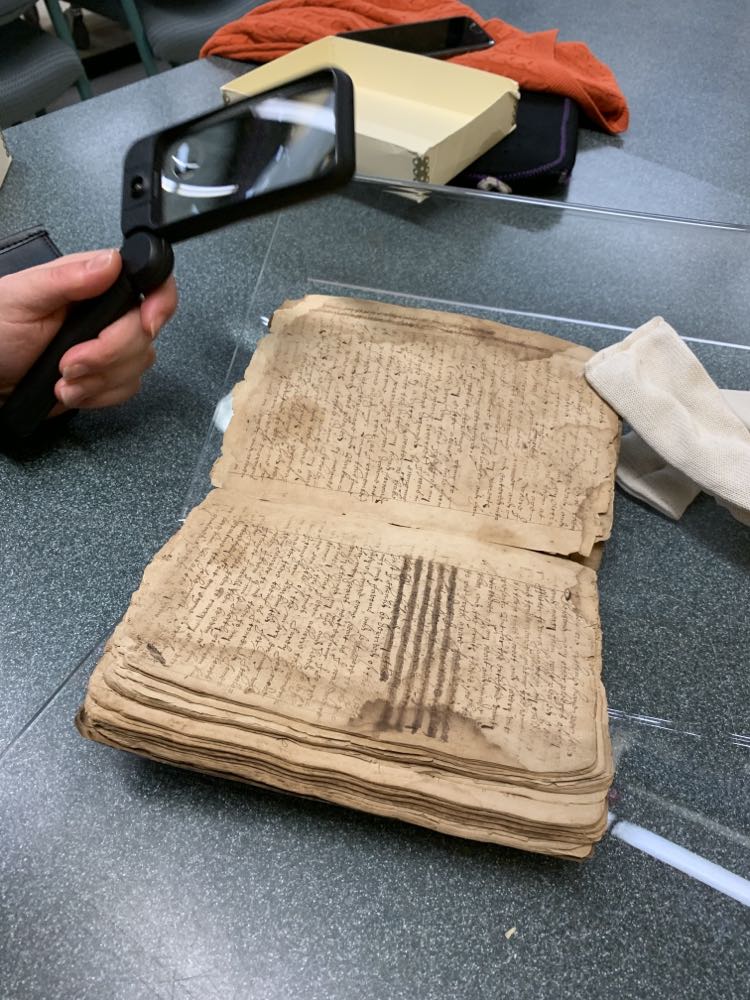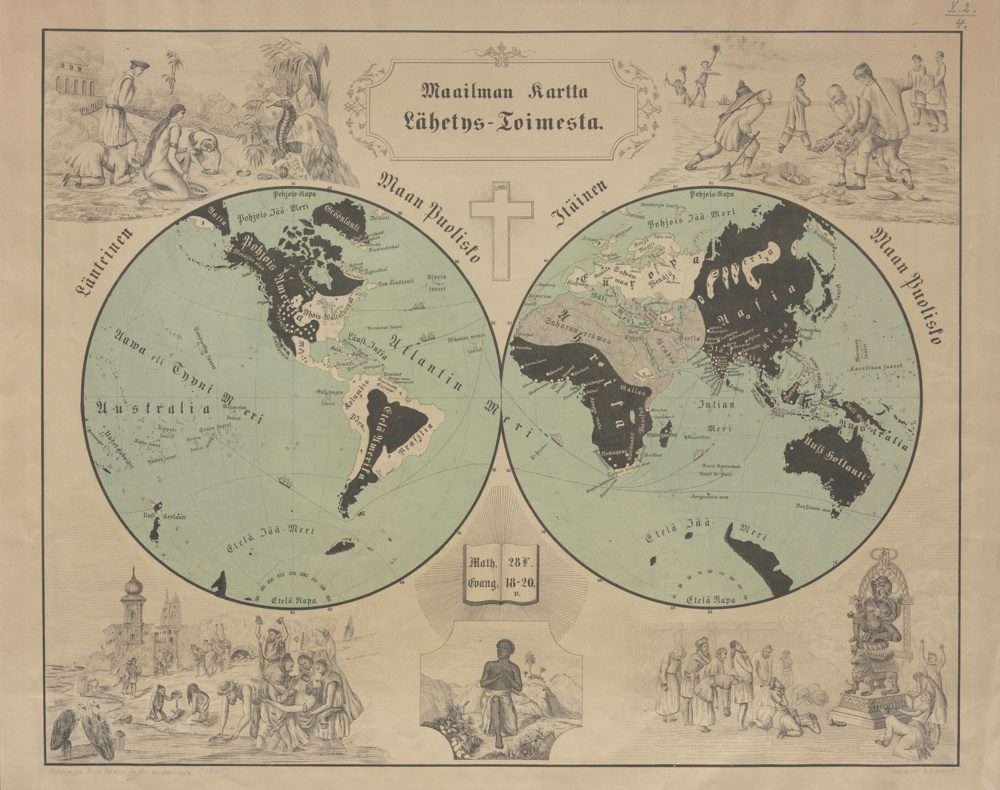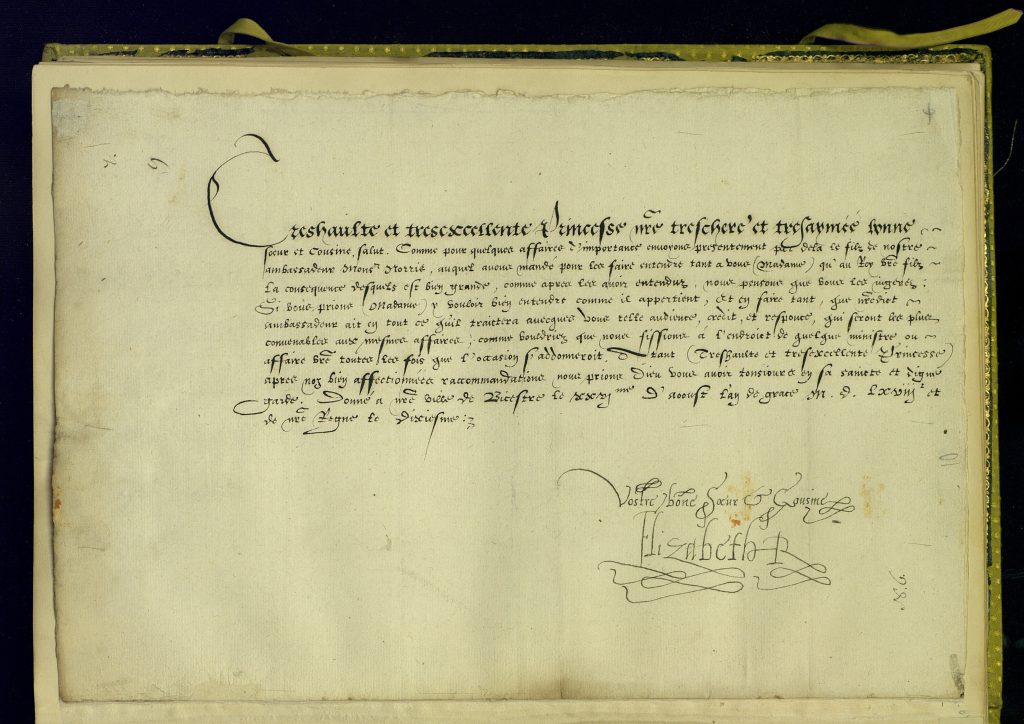Material Text Seminar VII – Workshop Challenging Materialities: Editing deletions in historical manuscripts
The Seventh Material Text Seminar took place via Zoom on 15 November 2023.

Programme
16.15 Opening words
16.20 Eva-Johanna Holmberg & Kirsty Rolfe:
Challenging Materialities: Editing deletions in historical manuscripts
17.05 Open discussion on the topic
17.50 Closing words
Abstract
Challenging Materialities: Editing deletions in historical manuscripts
This workshop introduces a discussion on the challenges of materiality through telling the story of the editing processes and difficult choices faced by editors working towards a new edition of Richard Norwood’s ‘Confessions’, contracted by the Hakluyt Society and due to be published in 2023/24. The ‘Confessions’ of Richard Norwood is a rare example of an early modern manuscript self-narrative by a lower-than middling sort seafarer. The manuscript features a number of erased sections, the contents of which this edition will reproduce for the first time. These sections pose particular challenges to the editors: the passages are difficult to read in the first place, and reconstructing the history of their deletion (who deleted them, and when; and, crucially, why they chose to do so) presents complex critical and material questions. Meanwhile, we need to decide how to approach our own material text: how should this history be presented on the pages of our edition? Tackling Norwood’s erasures demonstrates how practical and interpretative challenges are intertwined in especially fraught ways within practices of editing early modern texts. In this workshop we will explore how scholarly editors might approach such complicated, layered material texts, and the importance of interdisciplinary collaboration in doing so.
Dr Eva Johanna Holmberg is a University Researcher in the Department of Philosophy, History, and Art Studies at the University of Helsinki and a senior researcher of the Research Council of Finland project Experiencing Agony; Dr Kirsty Rolfe is a literary scholar and university lecturer at the Leiden University Centre for the Arts in Society.
Material Text Seminar VI
Material Text Seminar VI took place via Zoom on 10 May 2023.

Programme
16.15 Opening words
16.20 Johanna Skurnik (University of Helsinki): ‘Thinking about the Materiality of Maps’
16.50 Noah Millstone (University of Birmingham): ‘Judging Books in Early Modern Europe, c1494‒1700’
17.20 Antti Ijäs (University of Helsinki): ‘Layers of Composition in Royal Armouries MS I.33’
17.50 Closing words
MTRF Seminar V
16 Nov 2022, 16.00–18.00 EEST (UTC+2)
Programme
16.15 pm Opening words
16.20 pm Birte Bös (University of Duisburg-Essen): The materiality of historical English newspapers
17.05 pm Open discussion on the topic
17.50 pm Closing words
The materiality of historical English newspapers
This workshop takes different perspectives on the materiality of historical English newspapers, focussing particularly on the 18th and 19th centuries. It will outline how political developments (such as the introduction of the so-called ‘taxes on knowledge’) and technical innovations (e.g. in paper-making and printing technologies) affected the material shape of early English newspapers and consider contemporary perspectives on material aspects, as, for example, expressed in editorial comments. While research on historical newspapers has been facilitated by the rapid growth of digital archives in recent years, ‘media translation’, i.e. the ‘remediation’ from actual print to digitised online versions, poses challenges to the modern researcher that will also be discussed in this workshop.
Prof. Dr. Birte Bös is Full Professor at the Department of Anglophone Studies at the University of Duisburg-Essen.
MTRF Seminar IV
Our fourth seminar was held via Zoom on 18 May 2022, 16.00–18.00 EEST (UTC+3).

Programme
16.15 Opening words
16.20 Leena Kolehmainen (University of Turku): Varying Voices: Multilingualism in the Cemetery Linguistic Landscape
16.50 Samuli Kaislaniemi (University of Eastern Finland): Material aspects of the French letters of Queen Elizabeth I
17.20 Janne Harjula (University of Turku): Books as ritual objects in Early Modern burials
17.50 Closing words
MTRF Seminar III
The third Material Text Seminar of the Material Text Research Forum at the University of Turku was held via Zoom on 17 November 2021, 16.00–18.00 EET (UTC+2).
Programme
16.15 Opening words
16.20 J. D. Sargan (Institute of Medieval and Early Modern Studies, Durham University): Radiographic techniques in the study of bookbinding
16.50 Sonja Dahlgren (Queen Margaret University, Edinburgh): Phonological analysis of Egyptian Greek – Genre-specific language and material choices
17.20 Sakari Katajamäki (Finnish Literature Society – SKS): Editing Poems and Working with Documents
17.50 Closing discussion
MTRF Seminar II
The second Material Text Seminar of the Material Text Research Forum at the University of Turku was held via Zoom on 19 May 2021, 16.00–18.00 Finnish summer time (1–3 pm UTC).
This time, we had a single longer presentation of 45 minutes, followed by a 45-minute time slot for open discussion on the intersection of humour and graphic elements.
Programme
16.15 Opening words
16.20 Wendy Scase (University of Birmingham):
Graphic Play: Where Materiality and Text Meet?
17.05 Open discussion on the topic
17.50 Closing words
Graphic Play: Where Materiality and Text Meet?
Abstract and points of discussion:
“Wordplay is familiar to us all. It occurs in spoken and written language and operates on a spectrum of use ranging from baby babble to everyday linguistic creativity to canonical literary texts. Linguists propose that wordplay is central to language acquisition and literary critics have seen it as central to literariness. The concept of graphic play is currently much narrower. Graphic play is often seen as a feature of typography – where letter-forms and the layout of text on the printed page are used wittily or creatively — and as a phenomenon democratised by electronic media. So, currently, graphic play is seen as a phenomenon where materiality and text meet (graphic play engages the material level of the text’s transmission not just the text alone) but it is mainly recognised as a feature of modern printed or electronic media. I would like to invite consideration of the definition of graphic play and its applications. *How might we define graphic play to make it an enabling concept for research on the intersections of materiality and text in all periods and kinds of literate media? My own contribution to the forum will offer some possibilities illustrated with varieties of graphic play in medieval and early modern English manuscripts.
*Examples of questions that I’d hope we could discuss:
Can we think of decorated manuscript initials as playful (for example, initials involving grotesque figures or human faces) or is playfulness an anachronistic idea?
Is the transmission of text and introduction of variants ever playful?
Is cryptography ever open to consideration as playful?
How about micro-texts such as graffiti and ‘pen-trials’ – is there sometimes an element of play involved?”
Wendy Scase is Emeritus Geoffrey Shepherd Professor of Medieval English Literature at the University of Birmingham.
MTRF Seminar I
The first Material Text Seminar of the Material Text Research Forum at the University of Turku was organised on Wednesday 25 November 2020, 4.15–6 pm (UTC+2) via Zoom. The seminar consisted of three presentations of 15 minutes each, with 15 minutes reserved for discussion between the papers.
Programme
16.15 Opening words
16.20 Revealing Books’ Dirty Little Secrets: Or, How to Reach Medieval Readers
— Tuomas Heikkilä, Professor in Church History, Faculty of Theology, University of Helsinki
16.50 Manuprint: The Challenge of the Transmedial Book in Fifteenth-Century Europe
— Sonja Drimmer, Associate Professor of Medieval Art and Architecture, Department of the History of Art & Architecture, University of Massachusetts Amherst
17.20 “No room for Compliments”: Layered materiality of text in corpus-based historical sociolinguistics
— Tanja Säily, Assistant Professor in English Language, Department of Languages, Faculty of Arts, University of Helsinki
17.50 Closing discussion
